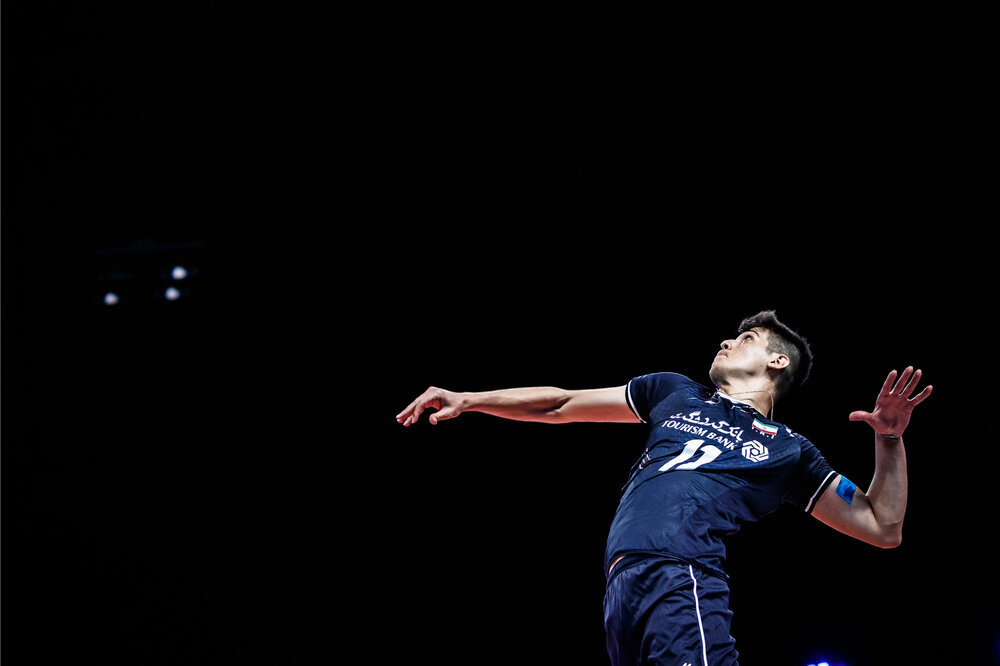The Spike of Silence: From power to prayer, the heartrending story of Kazemi

TEHRAN - One of Iran’s brightest volleyball stars, Saber Kazemi, went from lighting up arenas with his spikes to lying in a hospital room, fighting for life. His story is a haunting reminder of the human fragility behind the glory of sport.
The ball rose high above the net, a perfect set. Saber Kazemi leaped, that familiar explosion of grace and power, and slammed it down like thunder. For a moment, the crowd erupted. In that instant, he was everything a nation wanted him to be: strong, fearless, and beautifully alive.
Weeks later, the thunder came again — not from his arm this time, but from the silence that followed an unexpected tragedy.
Saber Kazemi, one of Iran’s brightest volleyball stars and a member of Qatar’s Al Rayyan Club, was found unconscious near the pool of his residence in Doha.
At first, reports spoke of an electric shock beside the pool. Then came whispers of a possible stroke, a sudden collapse, a mystery no one could quite explain. What remained certain was that he was rushed to the hospital, placed in a coma, and then, silence.
The uncertainty only deepened the heartbreak. Was it a medical emergency, an accident, or something no one saw coming? In the absence of clear answers, what endured was the weight of disbelief — how quickly a life built on strength and motion could fall still.
For days, teammates prayed, fans lit candles, and social media overflowed with messages of hope. The boy, who once had carried Iran’s dreams on his shoulders, now lays between life and death, a symbol of how fragile glory can be.
Kazemi’s journey had always been about rising. Born in Golestan Province, he was not a product of privilege but of perseverance. He grew up in a country where volleyball had become a rare source of joy, a sport that united millions beyond politics and economical pressure. When he first joined the national team, his spikes weren’t just points on the scoreboard; they were sparks of belief for a younger generation.
At 25, he was already a continental champion, an MVP in Asia, and a hero in waiting. Yet the cruel beauty of sport mirrors life; Unpredictable, breathtaking, and sometimes unbearably fragile.
In the quiet of a Tehran’s Payambaran hospital, Kazemi now lies surrounded by machines and whispered prayers. Doctors speak of brain damage; fans speak of miracles. Between those worlds — science and faith — hangs the fate of a young man who once made the world cheer.
Across Iran, people have paused to reflect. His tragedy has transformed into something larger, a collective moment of tenderness. Rivals have shared his picture, young athletes whisper his name before matches, and coaches remind players that sport is never just about winning, but about the courage to rise again, even when life falls silent.
Perhaps this is what Saber’s story teaches us: behind every powerful serve and every medal lies a heartbeat, fragile yet full of dreams. Heroes are not immortal; they are human. It is their humanity that makes them shine.
In the end, Kazemi’s name may not be remembered only for his spikes or medals. It may be remembered for what he represents — the fleeting brilliance of youth, the unity of a nation in prayer, and the reminder that sport, at its deepest core, is about life itself.
And yet, somewhere between life and what lies beyond, his heart still beats. Machines hum softly beside him, his body still warm, his spirit hangs in a fragile space between life and death. Around him, his family, friends, and millions of Iranians hold on, to faith, to love, to the impossible hope that he might open his eyes once more.
Because even now, in that quiet hospital room, the dream refuses to die.
Perhaps, just perhaps, there will come a day when Saber Kazemi rises again; When the silence breaks, and his hand, once more, meets the ball, sending it crashing down with the thunder of life itself.
And until that moment, the echo of his final spike lingers, not as a farewell, but as a heartbeat of hope.
Leave a Comment